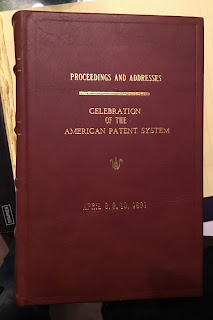Criticism of the US patent system pretty much began from the moment after It was enacted as the Patent Act of 1790.Thomas Jefferson, as the then Secretary of State, was in charge of head of the “Commissioners for the Promotion of Useful Arts”, which was given the authority to grant or refuse a patent after deciding whether the invention or discovery was “sufficiently useful and important to be granted a patent.”The first group of Commissioners included Thomas Jefferson, Henry Knox, and Edmund Randolph.
Widespread criticism of the examination under the Patent Act of 1790 led to its repeal by Congress and its replacement with the Patent Act of 1793. The Act of 1793 changed the US patent system from an examination system, under the Act of 1790, to a registration system.
Criticism of the Act of 1793, especially by Senator John Ruggles, Chairman of the Senate Patent Committee led to the led to substantial changes in the American patent system under the Patent Act of 1836. Under the 1836 Act, the American patent system was changed back to an examination system and examination was to be conducted by professional patent examiners, rather than the heads of executive department.In his brief discussion of the IP Clause, Madison states that "the utility of this power will scarcely be questioned."Unfortunately, that is still up for debate.However, that the US IP system remains one of the best in the world is strongly proven by those countries that voluntarily chose to copy it.
"The last legislative effort to control manufacture in the American Colonies while . they were still under British sovereignty was that of 1752. This banned the expoitation to America of tools for use in the making of fabrics from linen or -cotton. And cotton was even then important among colonial products. These various curbs on manufacture within the Colonies were of less influence than they would have been had the industries of that era been numerous and significant, but they did, nevertheless, work considerable mischi Some of these parliamentary interdictions were among the grievances recited in a protest by the colonists of Massachusetts in 1777 In 1785-2 years after the treaty of peace between England and the Colonies and 2 years before our Federal Constitution was framed-the British Parliament prohibited by law · the emigration of mechanics and workmen familiar with the manufacture of iron and forbade the exportation not only of engines, machines, or tools useful in the processing of iron, but even the models and plans of such mechanisms and implements. The purpose and, from the viewpoint of British ministries of those times, the justification of all these restrictions and repressions was to further the internal industry and the foreign trade of Great Britain. This intent was not only not . accomplished but was defeated, as history has impressively testified. For, within the recollection of Americans living in 1790, British statesmen realized .and sought to correct the error of the earlier policy. In 1853 a British mission was sent to the United States to_ study and emulate American methods of manufacturing arms. The genius of Samuel Colt was borrowed, so to say, for the same purpose. A member of that mission, in his account of its work, explained tha tthe (British) "Government resolved to introduce the American patent system."



